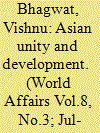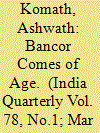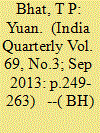|
|
|
Sort Order |
|
|
|
Items / Page
|
|
|
|
|
|
|
| Srl | Item |
| 1 |
ID:
135541


|
|
|
|
|
| Summary/Abstract |
The winding down of colonial empires in the middle of the twentieth century was greeted by a wave of revolutionary and reformist idealism in the newly liberated countries of the third world. many international agencies and movements rose to address the inequalities and injustices inherited from the old system but a reaction from the dominant former imperial powers managed to block or reverse that evolution and establish a subtler neo-colonial exploitative regime through the mechanism of globalization enforced by the petrodollar reserve currency, major banks and multinational corporations. Today various international associations such as ALBA, ASEAN, and BRICS are developing alternatives to the hegemonic Euro-American order.
|
|
|
|
|
|
|
|
|
|
|
|
|
|
|
|
| 2 |
ID:
183859


|
|
|
|
|
| Summary/Abstract |
John Maynard Keynes proposed the concept of ‘Bancor’ in 1940 as a supranational currency that would serve as the international reserve currency. The concept did not take off at the time, despite the underlying need to liberate the international system from the hegemonic tendencies of a national currency serving as a global medium of exchange. The emergence of Bitcoin makes it possible to revive the idea of a de-nationalised global medium of exchange. This article examines the feasibility of such an idea by examining a viable state policy for adoption and use in the international realm.
|
|
|
|
|
|
|
|
|
|
|
|
|
|
|
|
| 3 |
ID:
113684


|
|
|
|
|
| Publication |
2012.
|
| Summary/Abstract |
This paper discusses the role of Hong Kong in China's grand scheme to build up the RMB as a global reserve currency. We highlight the economic importance of Hong Kong to China in terms of channeling foreign direct investment into China, some of which, in the future, will be denominated in the RMB. We discuss the development of China's RMB currency swap and deposit markets in Hong Kong. These offshore markets enable the RMB to trade freely, setting the stage for the RMB to become fully convertible and allowing market forces to play a role in pricing the value of the RMB, and help in the development of the RMB-denominated bond (or dim sum bond) market in Hong Kong. Finally, we present evidence of the phenomenal growth of the dim sum bond market in Hong Kong, which can further enhance and strengthen the use of the RMB outside China.
|
|
|
|
|
|
|
|
|
|
|
|
|
|
|
|
| 4 |
ID:
146199


|
|
|
|
|
| Summary/Abstract |
This study identifies 37 central banks that added China’s renminbi (RMB) to their reserve portfolio since 2010. Why do some states diversify into new reserve currencies at an early stage while most continue to take a wait-and-see approach? We argue that state preferences regarding international order influence decisions to invest in RMB. While some states support the liberal, US-led status quo, others prefer an emerging Chinese alternative order. We contend that as state preferences for international order move away from the US model (and toward China), the likelihood of diversifying reserves into RMB should increase. Thus, the decision to invest in RMB is not simply an economic choice. It is also a political act that signals and symbolizes a state’s preferences for a diminution of American global influence and support for a revised order. Employing new United Nations General Assembly (UNGA) ideal points data, we find that states with larger (smaller) ideal point distance with the United States (China) are more likely to adopt RMB as a reserve currency. Furthermore, political consideration—rather than economic concerns about transaction needs, optimal portfolio considerations, or instrumental calculations—best explains emergent demand for the RMB as a reserve currency.
|
|
|
|
|
|
|
|
|
|
|
|
|
|
|
|
| 5 |
ID:
156256


|
|
|
|
|
| Summary/Abstract |
Will China’s currency, the renminbi (RMB), become a major international reserve currency that rivals the US dollar in the next decade? This article argues that this is unlikely for domestic political and economic reasons. China has some important systemic advantages that other recent challengers to the dollar have lacked, such as a large economy, a major role in the international trading system and substantial military capabilities. However, China’s domestic political system poses an important barrier to the internationalization of its currency. Chinese political institutions and financial policies reduce the attractiveness of the RMB as a reserve currency. Strong opposition to financial reform from Chinese interest groups has blocked reforms that would enhance the RMB’s attractiveness, and is likely to prevent substantial liberalizing reform in the future. Moreover, changes in China’s political economy during the Xi Jinping era (2012–present) have exacerbated these domestic deficiencies. Due to these various domestic political obstacles, the RMB is unlikely to emerge as a top reserve currency in the next ten years.
|
|
|
|
|
|
|
|
|
|
|
|
|
|
|
|
| 6 |
ID:
086593


|
|
|
|
|
| Publication |
2009.
|
| Summary/Abstract |
China has emerged as a major power in the world economy, so it seems natural to consider whether its currency will also have a major role. At present the renminbi is not used internationally. We look at the factors that contribute to the international use of currencies, and focus on the aspects of China's financial system that would have to change before the renminbi emerged as an important regional or world currency. Even with significant reforms, two questions would remain: whether the authorities would want to encourage its international use, and whether an economy with substantial party control could gain international acceptance for its currency.
|
|
|
|
|
|
|
|
|
|
|
|
|
|
|
|
| 7 |
ID:
122645


|
|
|
|
|
| Publication |
2013.
|
| Summary/Abstract |
The emergence of China as a powerhouse of the world economy has added a new dimension to the global currency market. China's impressive economic growth and phenomenal rise in exports have given considerable strength to its currency yuan in recent years. To what extent will China push to make the yuan the world's reserve currency has become a burning issue. Currently, the share of yuan in total world reserves is hardly 1 per cent. The reasons are obvious. The yuan is not fully convertible, the capital market is shallow, the exchange rate is not flexible and international acceptance of yuan as a store of value is non-existent. In the face of these constraints, China is showing an inclination to make the yuan an international currency and to rival the US dollar and euro. Increase in the inflow of foreign direct investment as well as outflow of investment abroad is enabling China to move towards internationalisation of yuan in the near future. Regionalisation of the yuan is gaining importance with rise in its international trade in Asia. China has now allowed the commercial banks in Hong Kong to accept the yuan-denominated deposits. It is further extending loans in yuan to developing countries. Many steps are being taken towards making the yuan an international reserve currency. At the outset, it appears that the yuan would become an international currency in the foreseeable future.
|
|
|
|
|
|
|
|
|
|
|
|
|
|
|
|
|
|
|
|
|